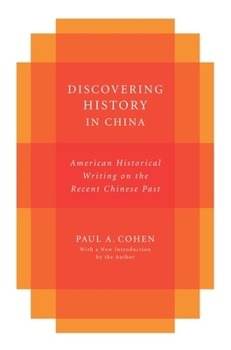Discovering History in China: American Historical Writing on the Recent Chinese Past
(Part of the Studies of the Weatherhead East Asian Institute, Columbia University Series)
Select Format
Select Condition 
Book Overview
Since its first publication, Paul A. Cohen's Discovering History in China has occupied a singular place in American China scholarship. Translated into three East Asian languages, the volume has become essential to the study of China from the early nineteenth century to today.
Cohen critiques the work of leading postwar scholars and is especially adamant about not reading China through the lens of Western history. To this end, he uncovers the strong ethnocentric bias pervading the three major conceptual frameworks of American scholarship of the 1950s and 1960s: the impact-response, modernization, and imperialism approaches. In place of these, Cohen favors a "China-centered" approach in which historians understand Chinese history on its own terms, paying close attention to Chinese historical trajectories and Chinese perceptions of their problems, rather than a set of expectations derived from Western history. In an important new introduction, Cohen reflects on his fifty-year career as a historian of China and discusses major recent trends in the field. Although some of these developments challenge a narrowly conceived China-centered approach, insofar as they enable more balanced comparisons between China and the West and recast the Chinese and their history in more human, less exotic terms, they powerfully affirm the central thrust of Cohen's work.Format:Paperback
Language:English
ISBN:0231151934
ISBN13:9780231151931
Release Date:April 2010
Publisher:Columbia University Press
Length:296 Pages
Weight:1.00 lbs.
Dimensions:0.8" x 5.9" x 8.9"
Grade Range:Postsecondary and higher
Customer Reviews
1 rating
China at the Center
Published by Thriftbooks.com User , 20 years ago
The following review is based on the 1984 edition. In "Discovering History in China" Cohen argues that much of the scholarship in the West that had occurred on China prior to the mid-1970's, (particularly American scholarship), had been conducted with an "ethnocentric distortion". Because the West had an impact in shaping modern China, pre-World War II (W.W. II) studies on China tended to focus on matters Western countries had a direct role in, such as the Opium Wars, missionary work, the Taiping uprising, sino-foreign trade, etc.. These studies tended to be from missionaries, diplomats, and others who had no formal training as historians. In post-W.W. II studies of China (while the subject matter had widened) emphasis "was still to an overwhelming extent on the shaping role of the Western intrusion"(p.2). Much of what was written after W.W. II, according to Cohen, viewed the Western role in shaping modern China in a positive light. It was not until the liberalism of the late 1960's that historians began to question this purely positive look at imperialism and looked instead at ways the Western involvement in China had affected the "natural forward movement of Chinese history". However, many scholars still saw the West as the main antagonist in preventing China's 'modern development'. Chapter one deals with the amount of influence Western nations had on events shaping China in the late 1800's. Cohen believes that the amount of influence the Western imperialist countries had on events inside China during the late 1800's was negligible overall. It was only after the Tongzhi Restoration that the Western presence in China played any significant role in shaping Chinese affairs. Even the reform efforts of 1898 - how much can be contributed to a reaction to the 'Western threat' and how much can be contributed to reactions to domestic conditions. In the second chapter, "Moving Beyond Tradition and Modernity", Cohen takes aim at the notion of an unchanging China. Much of this section is a variant of the first chapter, where Cohen discusses the views of scholars from the 1950's and 1960's such as Joseph Levenson and John K. Fairbank. During this time the dominant view was that the concept of change or modernization in China was a product of direct contact with the West. In other words, China could not have "modernized" on its own without some kind of impetus from outside. This concept of an unchanging China in American scholarship began to be questioned and negated with the introduction of Philip Kuhn's study "Rebellion and its Enemies in Late Imperial China"(1970). In this study, Kuhn attempts to redefine the question of Chinese modernity, moving away from a belief that change only occurred with help from the Western presence in the mid- to late 1800's to one that scrutinized domestic changes taking place in China long before the Western presence. Much of chapter three "Imperialism: Reality or Myth?" analyzes the diatribe of James Peck





